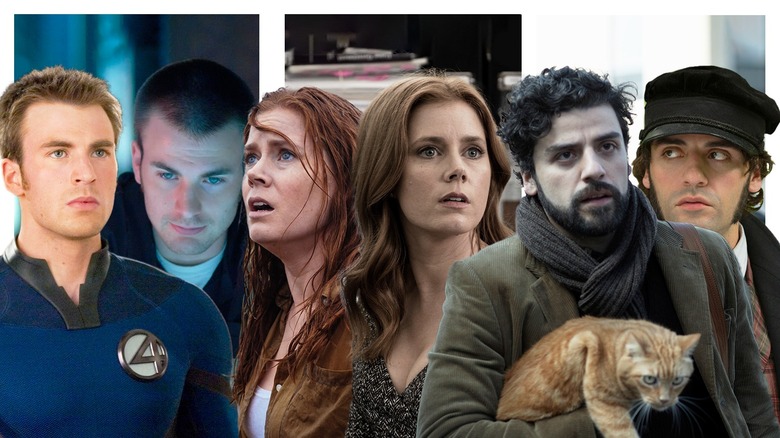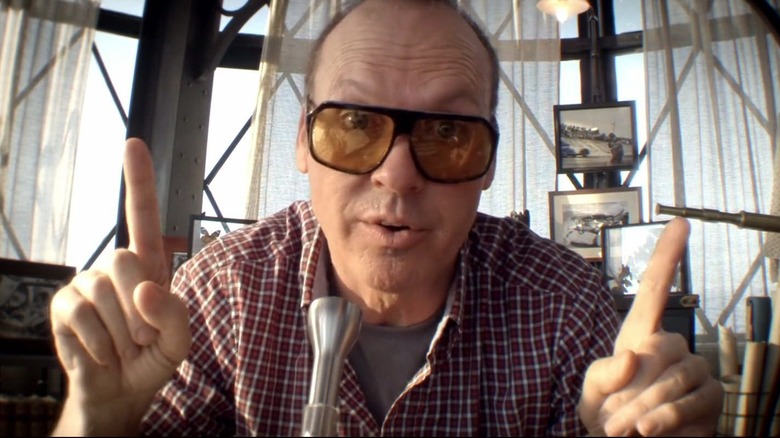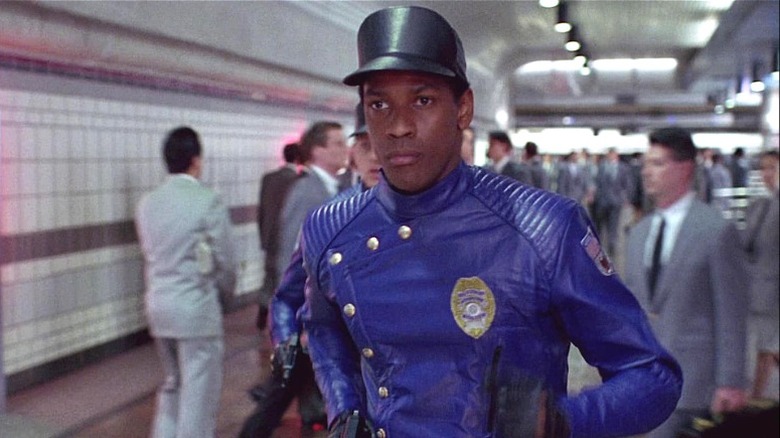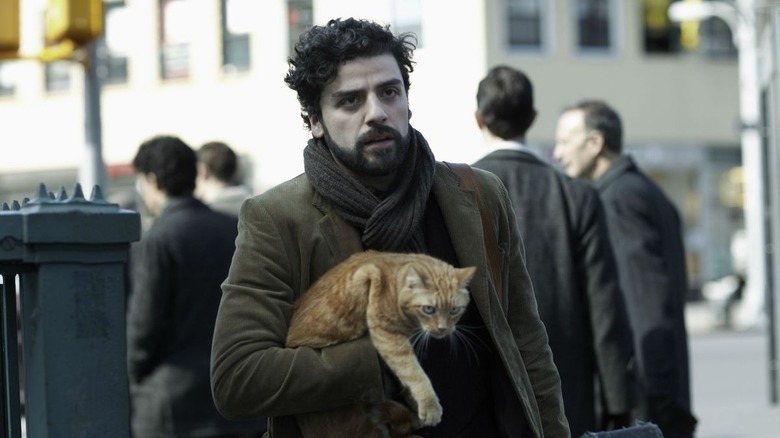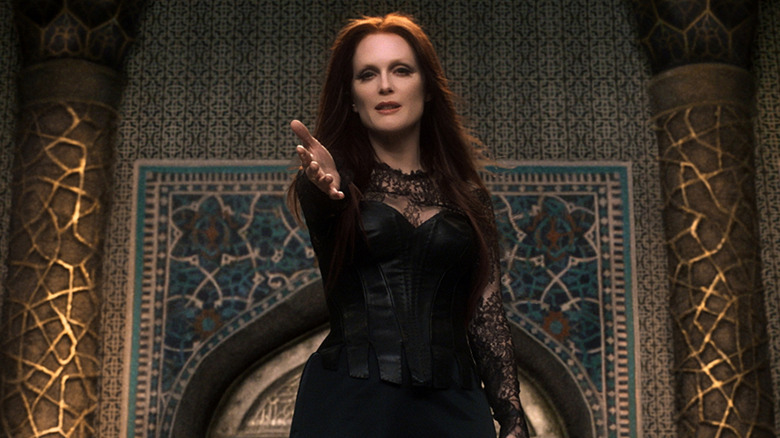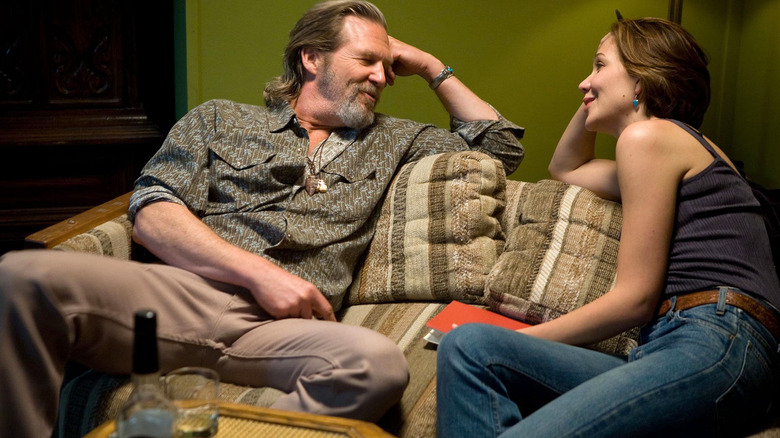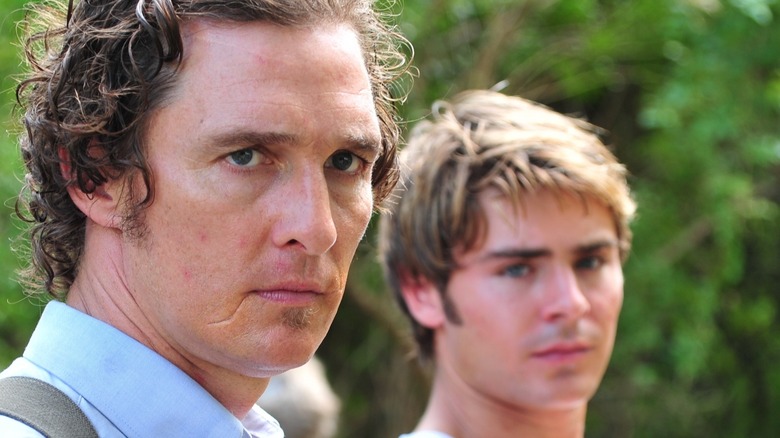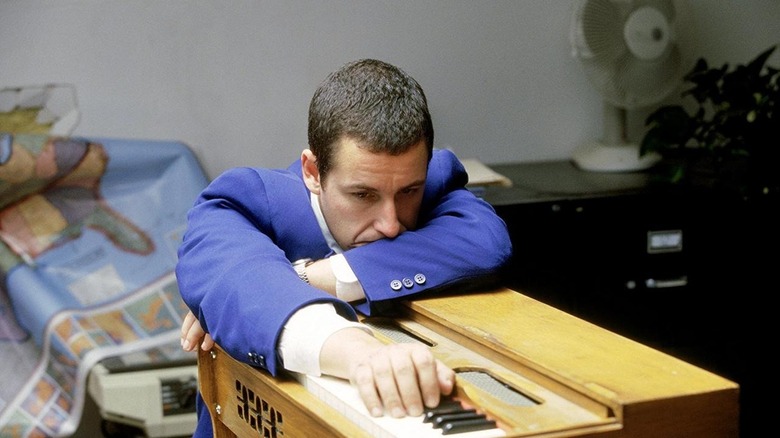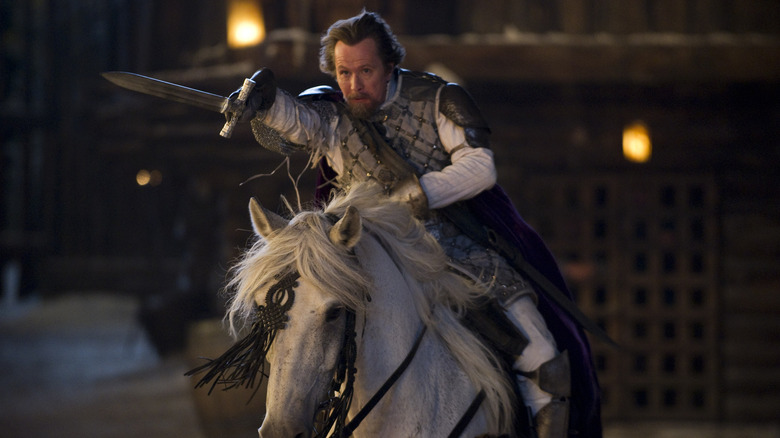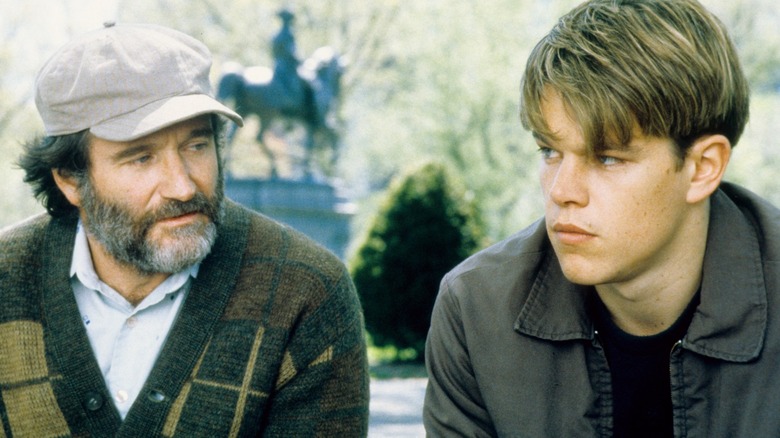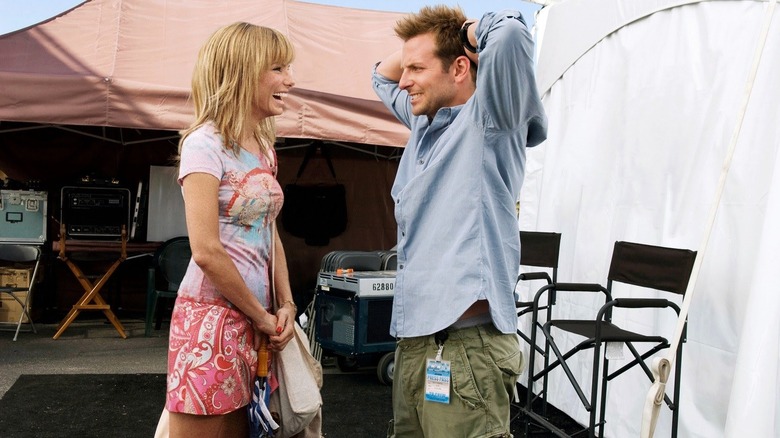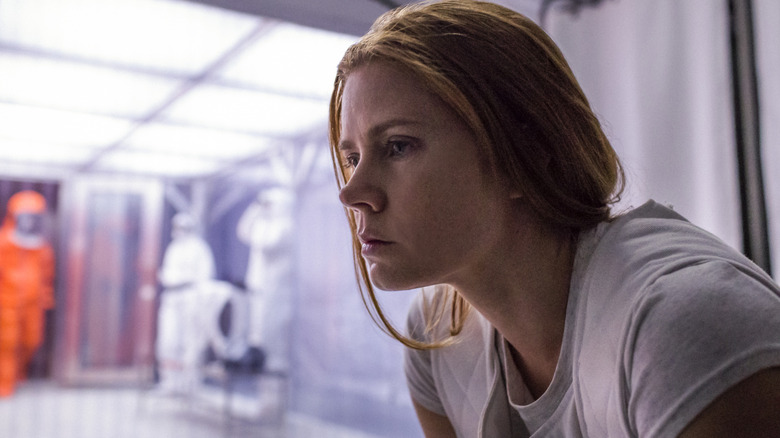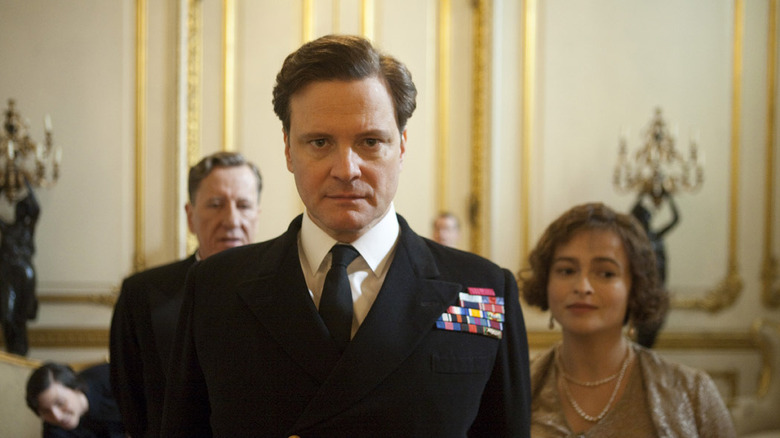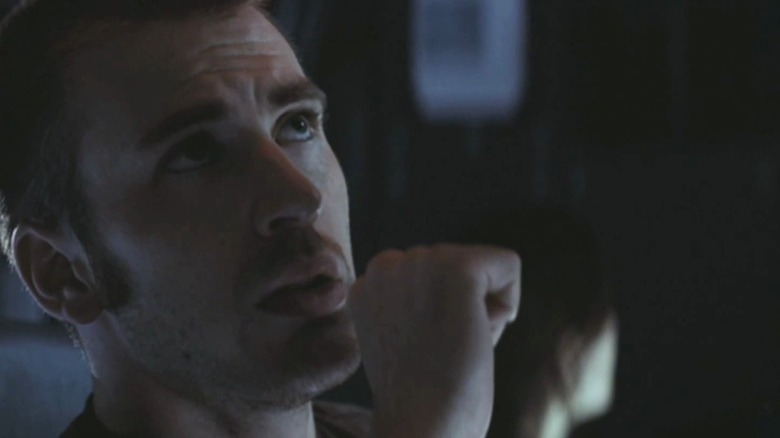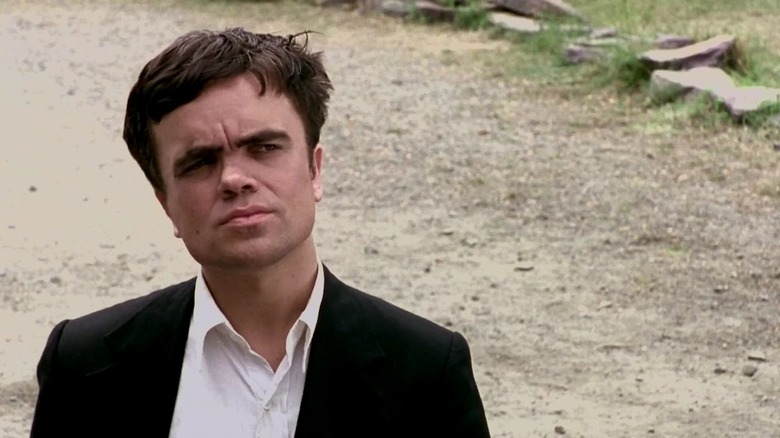Actors That Released Their Career Best And Worst Movie In The Same Year
The career of an actor can often be as frustrating as it is exhilarating, with the pendulum swinging frequently between success and failure. A movie that looks like a winner on paper can end up being a dud with audiences and critics alike, while a seemingly frivolous genre movie can launch you to new levels of stardom. The life of an actor is one of unpredictability, and it's impossible to predict just what will resonate with audiences and why. The erratic nature of Hollywood means that many actors have managed to headline both the best and worst movies in their careers within a single year. Though it may sound impossible, performers are more than capable of generating Oscar buzz for one movie while another is simultaneously getting savaged by critics.
This phenomenon has happened to a wide variety of actors across the decades, uniting them in the fickle world of the performing arts. Their worst movies stand as a testament to just how complex the machinery of filmmaking can be, while their best can remind actors and audiences alike that no bad patch in one's career lasts forever.
Michael Keaton
After years of being a steady character actor, Michael Keaton came back in a massive way in 2014. Headlining the Best Picture-winning drama "Birdman" reaffirmed that Keaton not only had leading man chops but that he could surprise people even decades after his star-making performances in "Mr. Mom," "Beetlejuice," and "Batman." It was a revelatory turn that breathed new, exciting life into Keaton's filmography. "Birdman," however, wasn't the only motion picture he appeared in that year. 2014 also saw the actor showing up in one of the weakest titles in his filmography, the instantly-forgotten video game adaptation "Need for Speed."
This misguided Aaron Paul vehicle saw Keaton playing "Monarch," the host of an illicit racing competition. Keaton's work in the movie sees him largely isolated from all the other prominent characters, speaking expository dialogue into a microphone. While it did give Keaton a chance to deliver some amusingly over-the-top dialogue, the role was otherwise appropriately forgettable for such a disposable action feature. "Need for Speed" was the very definition of paint-by-numbers, with even the sequences heavy on car crashes and explosions often being unengaging. In other words, this was the total opposite of the bold work in "Birdman" that would give Keaton his creative renaissance. At least the dismal quality of "Need for Speed" allowed audiences to further appreciate Keaton getting a chance at a big comeback later that year.
Denzel Washington
"Devil in a Blue Dress" wasn't a box office monster when it first opened in theaters in 1995, but in the years since its debut, audiences have come around to being enamored with this neo-noir anchored by Denzel Washington (per The Playlist). It's hard not to be captivated by Washington as detective Easy Rawlins. Meanwhile, the visual palette of the feature is gorgeous, not to mention impressive in how it juggles visual motifs of classic noirs without sacrificing its own creative impulses in the process. Even with how many movies Washington has led over the years, "Devil in a Blue Dress" stands alongside the likes of "Malcolm X" as the man's greatest star vehicle.
However, "Devil in a Blue Dress" wasn't the only Denzel Washington film occupying movie theaters in 1995. This same year saw the debut of "Virtuosity," an action thriller following Washington as a former cop tasked with taking down a virtual criminal (Russell Crowe) who's broken out into reality. While Washington has managed to headline enjoyably trashy action fare in the past with the likes of "Ricochet," "Virtuosity" did not end up being that kind of movie. This feature was decimated by critics and now ranks as one of the more puzzling endeavors in Washington's filmography. Luckily, "Devil in a Blue Dress" was around that year to wash the taste of "Virtuosity" out of people's mouths.
Oscar Isaac
After several years of being a notable supporting character actor and occasionally headlining box office non-starters, Oscar Isaac made the leap to successful leading man in 2013 with "Inside Llewyn Davis." Playing the titular cash-strapped folk musician, Isaac was a revelation. Now that he's become the internet's boyfriend, it's easy to forget how utterly shocking it was to see him own the screen as Davis. This man had delivered talented performances before, but never to this degree. With so much screen time and a rich Coen Brothers screenplay at his disposal, Isaac crafted a character whose pain could simultaneously irritate and devastate the audience. It was a richly complicated performance, and it's no wonder it led to his breakthrough as an actor.
Isaac was also one of the leads of "Therese," an erotic thriller from director Charlie Stratton that began playing at film festivals in 2013. Whereas "Inside Llewyn Davis" became a beloved masterpiece, "Therese" was hated by critics, with many of the biggest complaints being leveled at the feature's erratic tone and its unappealing visual aesthetic. Granted, "Therese," which featured Isaac as the secret lover of a married woman, at least recognized that the actor was perfect fodder for romantic infatuation. But otherwise, "Therese" was a strange and detested motion picture, not to mention a strange title to get released the same year Isaac anchored "Inside Llewyn Davis."
Julianne Moore
Though it had a one-week qualifying run in 2014 to ensure it could compete in the 87th Academy Awards, the North American theatrical run of "Still Alice" didn't begin in earnest until January 2015. Once this film landed in theaters, audiences were quickly taken aback by Julianne Moore's staggering lead performance as a woman dealing with Alzheimer's. It's a brutal arc to watch unfold, but Moore handles all the finer details and quieter moments beautifully. In a career of memorable go-for-broke performances in movies like "Boogie Nights," her work in "Still Alice" still registers as commanding and impressive.
A few weeks after "Still Alice" began its big-screen journey, another movie featuring Moore landed in theaters. This project, with its massive action sequences and heavy presence of CGI fantasy monsters, was slightly different than the intimate drama of "Still Alice." This project was "Seventh Son," a fantasy epic that saw Moore occupying the role of the film's villain. There was no shortage of star power in "Seventh Son," including Jeff Bridges as a wise wizard, but it wasn't enough to salvage an expensive disaster. Not even Moore vamping it up as a baddie was enough to make it a worthwhile watch. It's remarkable to look back on the early weeks of 2015 and realize that a movie theater could've been playing both the peak and nadir of Julianne Moore's filmography.
Jeff Bridges
By 2009, Jeff Bridges had been scoring high-profile roles in movies for nearly 40 years. In that time, he'd explored countless genres, established several iconic characters (The Dude from "The Big Lebowski" alone is bound to endure forever), and been nominated for four Academy Awards. A staple of big-screen storytelling, it was high time Bridges score an Oscar. That's just what happened when he played tormented country singer Otis "Bad" Blake in "Crazy Heart" in 2009. It's a role that exploits Bridges' own legacy to create a character whose aching weariness seems so real. You believe Blake has been through the fire and flames for decades. It's a fantastic performance from Bridges, and one that gave Hollywood and general moviegoers alike a chance to appreciate his gifts.
That same year, though, Bridges anchored "The Open Road" with Justin Timberlake. One would imagine that combining two instantly recognizable names like that would have resulted in something at least interesting, but "The Open Road" became one of the most detested features in the expansive filmography of Jeff Bridges. The movie was plagued by rampant criticisms, suffering from weak writing and a lack of interesting material for Bridges to handle. Needless to say, "The Open Road" was a horse of a wildly different color compared to the far more famous 2009 film Bridges headlined.
Matthew McConaughey
2012 was a year of taking chances for Matthew McConaughey. With the actor looking to expand his image beyond just romantic comedies like "Fool's Gold" and "How to Lose a Guy in 10 Days," McConaughey began to tackle challenging roles and work with intriguing auteurs. Embracing a wide variety of projects meant that there were going to inevitably be some duds in the actor's 2012 slate, and such a nadir came with "The Paperboy." A melodrama from director Lee Daniels, McConaughey was one of the many actors in the ensemble cast grappling with a thick accent and a plot that could be borderline incomprehensible.
"The Paperboy" has moments where it comes to life (and Nicole Kidman's gusto performance is commendable), but it's mostly a wash thanks to lackluster style and extremely predictable third-act narrative "twists." On the other hand, McConaughey also managed to headline one of his very best movies in 2012 by taking on a supporting role in "Bernie." Playing an officer who seems to be the only one suspicious of Jack Black's titular protagonist, McConaughey takes on a unique character compared to his usual roles, demonstrating his deft comedic chops at the same time. 2012 was a year of experimentation for McConaughey, and both "The Paperboy" and "Bernie" exemplify that for better and for worse.
Adam Sandler
In 2002, the man responsible for giving the world Opera Man collaborated with the filmmaker behind "There Will Be Blood." On paper, it seemed like a bizarre combination, perhaps the result of a late-night bar bet that got out of control. But in execution, pairing up Adam Sandler with director Paul Thomas Anderson on "Punch Drunk Love" resulted in one of the most exciting performances in Sandler's career, a forceful performance that contended with darkness in a shockingly believable fashion. In this movie, Sandler doesn't seem out of step with Anderson's filmmaking style — rather, he flourishes in it. A whole new world of acting possibilities for Sandler was unfolding in real-time.
Unfortunately, that same year, Sandler indulged in another gross-out PG-13 comedy in the form of "Eight Crazy Nights." The one distinguishing factor of this movie was that, unlike most other Sandler movies, this was an animated film. While giving Sandler a new kind of filmmaker to work with pushed him to new heights as an actor, giving Sandler a new medium of storytelling to utilize just resulted in stale rehashes of familiar gags from earlier Sandler vehicles. Frustrating in its laziness and how much it left on the table in utilizing the possibilities of animation for amusing comedy (not to mention wasting the opportunity to add some much-needed Hanukkah representation to the holiday movie canon), "Eight Crazy Nights" is the antithesis to Sandler's work in "Punch Drunk Love" the very same year.
Gary Oldman
In retrospect, it's staggering to realize Gary Oldman didn't score an Oscar nomination until 2011 with the espionage thriller "Tinker Tailor Soldier Spy." Oldman's excellent in the film and more than worthy of awards attention, but it's still astonishing to think he'd never scored Oscar love for prior works like "Prick Up Your Ears" or "The Contender." Inexplicably delayed award season love aside, Oldman really is terrific in "Tinker Tailor Soldier Spy," with the actor especially excelling at communicating so much interior life for his character within the intentionally restrained ambiance of the feature. Oldman is famous for his enjoyably over-the-top displays of acting, but "Spy" reminded us all that he could do extraordinary subdued work as well.
That same year, Oldman showed up as an antagonistic figure armed with a gigantic metal elephant in "Red Riding Hood." Oldman is no stranger to showing up in supporting roles in schlocky genre fare (he was the villain in "The Hitman's Bodyguard," after all), but "Red Riding Hood" is one of the most tedious and forgettable movies he's ever shown up in. A paint-by-numbers attempt to make a moody "Twilight" knock-off with iconography lifted from the "Little Red Riding Hood" fairy tale, "Red Riding Hood" is neither fun nor trashy enough to be worth a watch. What a strange movie to come out the same year as a career high point like "Tinker Tailor Soldier Spy."
Robin Williams
In his lasting legacy as an actor, there are many qualities of Robin Williams that have endured in the public consciousness. While some remember his rapid-fire wit and others can never forget his gift for impressions, an especially lasting quality of this man's career is his gift for warmth. Williams could exude an inviting aura like nobody's business, and that trait was particularly apparent in his work in "Good Will Hunting" as the character Dr. Sean Maguire. In this film, Williams deftly played a man who could help withdrawn college students come out of their shells while simultaneously conveying that Maguire was somebody struggling to let go of his own past. It was a complicated role, but one to which Williams lent incredible authenticity and vulnerability.
The same year Williams was crushing it in "Good Will Hunting," though, he also anchored the comedy dud "Fathers' Day" with Billy Crystal. One would imagine that pairing up Williams and Crystal would have to result in something memorable or amusing, but alas, "Fathers' Day" is the worst kind of comedy: utterly forgettable. Even with Williams sometimes putting too much energy into the film's big comedic set-pieces, "Fathers' Day" was a snooze. While this feature has faded away from the public consciousness, films like "Good Will Hunting" exemplify why Robin Williams won't be forgotten anytime soon.
Sandra Bullock
Even back when it first came out in 2009, the Sandra Bullock star vehicle "The Blind Side" garnered criticism from outlets like The Dallas Observer, among others, for being a white savior narrative. More than a decade of reflection and evolution in how we talk about depictions of Black people in cinema has only increased the criticisms. However, "The Blind Side," largely based on reviews it received in its initial theatrical release, is still one of Bullock's best-reviewed features and scored the performer her first Oscar. "The Blind Side" isn't a universally-beloved feature, but it's safe to say it's one of Bullock's biggest hits, especially with audiences, who gave the movie an A+ CinemaScore grade.
Whereas "The Blind Side" has received bursts of criticism, another Sandra Bullock movie from 2009 received nothing but vitriol from everyone who saw it. The romantic comedy "All About Steve" was widely lambasted for suffering from a dearth of laughs and for Bullock's character coming off as more unnerving than humorous. Not even the presence of actors like Bradley Cooper or Thomas Haden Church was enough to salvage this disaster. 2009 was a big comeback year for Bullock that involved her finally scoring Oscar gold, with "The Blind Side" redefining what heights she could rise to while "All About Steve" hit theaters to remind people of the nadir of her creative exploits.
Amy Adams
The idea of Amy Adams playing Lois Lane sounds like a great concept. Lois is a charming character who has endured in pop culture for a reason, and the acting chops of Adams could lend her new levels of depth. Rather than being overwhelmed by CGI mayhem or reduced to a cornball love interest, an actor of her caliber had the potential to stand out and command the screen. 2013's "Man of Steel" introduced Adams' Lois, giving fans plenty of reasons to look forward to more. Unfortunately, the 2016 follow-up "Batman v Superman: Dawn of Justice" offers Adams nothing of substance to do. Her version of Lois Lane is saddled with a dreary detective storyline that feels extraneous from the central Batman/Superman plotline. Worse, her exposition-heavy investigation scenes never give Adams a chance to indulge in her greatest strengths as an artist.
Thankfully, eight months after "Dawn of Justice," audiences would see Adams in a more substantive role as Louise Banks, the linguist who functions as the protagonist of "Arrival." Adams is endlessly compelling in this part and provides a distinctly human anchor to orient a plotline involving human beings trying to communicate with aliens. While her second time playing Lois Lane was a total wash, Adams proved shortly after "Dawn of Justice" why she's a titan among modern actors with her work in "Arrival."
Colin Firth
In "The King's Speech," Colin Firth's gifts for elevating material are on full display. The period piece doesn't really do anything too fresh or challenging, but there's enough of an agreeable air for Firth to work with as a performer. Give this man an inch, and he can make a mile out of it. Tasked with playing King George VI, Firth worked overtime to make sure his performance registered as something human rather than a hollow echo of the past. In the process, he and the rest of the star-studded cast managed to make "The King's Speech" something quite entertaining. What seemed on paper to be entirely disposable ended up being irresistibly compelling, mostly thanks to performances like Firth's.
The same year that Firth delivered a knockout performance as King George VI, he could also be seen headlining the long-forgotten feature "Main Street." Set in a cash-strapped North Carolina town, "Main Street" saw Firth playing a man with a scheme to possibly save the desolate community. While Firth was able to inject humanity into potentially corny parts of "The King's Speech," even he couldn't salvage "Main Street," a movie critics dismissed as thoroughly predictable and heavy on schmaltz. While Firth's talents were being bellowed out by "The King Speech" in 2010, they weren't even registering as a whisper the same year in "Main Street."
Chris Evans
Before he became Captain America, Chris Evans was playing another Marvel Comics superhero: Johnny Storm, aka The Human Torch. His second outing as the character came with "Fantastic Four: Rise of the Silver Surfer," which attempted to work more of the weird cosmic elements from Fantastic Four comics into the big screen version of Marvel's first family. Unfortunately, these ambitions just resulted in an even more underwhelming movie than the already terrible 2005 "Fantastic Four" feature. The interpretations of famous comic book characters like Galactus in "Rise of the Silver Surfer" were terrible, and the film's broad attempts at comedy weren't much better.
That same year, Evans also headlined one of the very best works in his filmography, "Sunshine." A Danny Boyle directorial effort anchored by Cillian Murphy, Evans got far more substantive and atmospherically interesting material to work with in "Sunshine." To boot, the project demonstrated his gift for working well within ensemble casts, a trait that would suit him well in later motion pictures like "Snowpiercer," "Knives Out," and even his final two appearances as Captain America. "Rise of the Silver Surfer" proved that not even the charm of Chris Evans could salvage this woeful vision of a superhero team. By contrast, "Sunshine" offered a glimpse into the kind of talents Evans can express when he's given the room and some quality writing to work with.
Peter Dinklage
In 2003, "Tiptoes" debuted on the American film festival scene, in the process birthing countless memes and inspiring moviegoers everywhere to ask where Matthew McConaughey and Gary Oldman were going in their leading man careers. Oldman and McConaughey weren't the only ones slumming it in this miscalculated motion picture, as Peter Dinklage was in the supporting cast of "Tiptoes." Not even the versatility and exceptional talents of Dinklage were enough to lift "Tiptoes" out of the gutter. Decades after its release, "Tiptoes" remains a pop culture punching bag and a nadir for many of the actors involved (via Movie Nation).
That same year, Dinklage anchored the easygoing and quietly moving indie feature "The Station Agent." A feature hailing from "Spotlight" director Tom McCarthy, "The Station Agent" gave Dinklage ample room to play a fascinating protagonist with an incredibly gruff exterior hiding complexities that ensure you can't turn away from him. Needless to say, Dinklage is remarkable in "The Station Agent," with the actor establishing the kind of quality performances audiences would see him deliver countless times over the years to come. As "The Station Agent" garnered Dinklage considerable awards attention, it'd be easy to forget that, the same year "Agent" was released, Dinklage was connected to a movie as despised as "Tiptoes."
